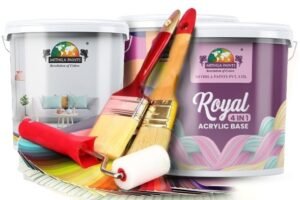Introduction to Customer Testimonials
Mithila Paints Manufacturing, a prominent name in the paint manufacturing industry, has earned a reputation for producing high-quality, eco-friendly paints. The company traces its origins back to the early 1990s when it was founded with a mission to revolutionize traditional paint production methods by incorporating environmentally sustainable practices. Over the years, Mithila Paints has grown significantly, establishing itself as a pioneer in offering products that combine durability with eco-friendliness.
The company’s product line includes a diverse range of paints, such as water-based emulsions, oil-based enamels, and specialized coatings tailored for various applications. These products are celebrated for their superior finish, long-lasting results, and minimal environmental impact. A unique selling proposition of Mithila Paints is its commitment to using non-toxic materials, which has resonated well with eco-conscious consumers and set the company apart in a competitive market.
Geographically, Mithila Paints serves an extensive market, catering to both residential and commercial sectors. Their key markets include not only domestic regions but also international territories where the demand for sustainable paints is on the rise. This broad market reach has been instrumental in cementing Mithila Paints’ position as a trusted name in the industry.
Despite their success, Mithila Paints has faced several challenges in marketing and establishing a trustworthy brand. One major hurdle has been differentiating itself in a saturated market with numerous well-established players. Additionally, reassuring new customers of the efficacy and environmental benefits of their products has demanded consistent effort. To address these challenges, Mithila Paints has focused on leveraging customer testimonials as a robust marketing tool. Testimonials have proven instrumental in building credibility, fostering consumer trust, and enhancing brand loyalty.
The Growing Importance of Customer Testimonials in Modern Marketing
In contemporary marketing practices, customer testimonials have emerged as a vital component, dramatically altering the dynamics of brand-customer interactions. The shift from conventional marketing methods to customer-centric paradigms has underscored the significance of authentic feedback from satisfied clients. This transformation hinges on the profound impact that testimonials have on consumer behavior, fostering increased brand credibility and enhancing customer confidence.
Case studies further illuminate the efficacy of testimonials in driving consumer action. For instance, a study by Spiegel Research Center indicates that displaying reviews can increase conversion rates by 270%. This surge underscores that positive testimonials not only validate the quality of a product but also incentivize potential customers to follow through with their purchase. This phenomenon is particularly pronounced in the digital age, where the ease of accessing peer reviews has transformed the landscape of consumer research.
Moreover, customer testimonials act as potent tools for establishing trust and credibility in an overcrowded market. They provide social proof, validating a brand’s claims and mitigating skepticism. Companies like Amazon heavily leverage customer reviews to enhance transparency and trust, leading to substantial growth in customer loyalty and sales. Such strategies epitomize the essential role of testimonials in modern marketing, showcasing real experiences that resonate with potential buyers.
In essence, customer testimonials have become indispensable in the digital marketing arena. They bridge the gap between marketing rhetoric and consumer trust, offering authentic narratives that validate a brand’s promise. As the marketplace continues to evolve, integrating testimonials into marketing strategies will remain pivotal for fostering consumer trust and driving business success.

Implementing Customer Testimonials at Mithila Paints
Mithila Paints embarked on the initiative to incorporate customer testimonials as a cornerstone of their marketing strategy in response to the evolving dynamics of consumer trust and digital engagement. Recognizing the increasing influence customer reviews had on purchasing decisions, the company aimed to leverage authentic feedback to build credibility and strengthen their brand presence.
The planning stage commenced with an in-depth analysis of customer feedback mechanisms. Mithila Paints identified multiple touchpoints for collecting testimonials, including post-purchase surveys, feedback forms provided both online and in-store, and active engagement on social media platforms. Understanding that a systematic approach was imperative, the company employed dedicated teams to oversee these channels and ensure a consistent flow of genuine customer insights.
To gather a diverse and comprehensive collection of testimonials, Mithila Paints reached out to a broad spectrum of their customer base. Surveys were meticulously designed to encourage detailed responses, asking customers about their experiences with product quality, service efficiency, and their overall satisfaction. Social media played a pivotal role; the marketing team monitored mentions and hashtags related to Mithila Paints, engaging with customers who shared their stories and experiences publicly.
Once collected, testimonials underwent a careful curation process. The marketing team emphasized authenticity, selecting testimonials that offered specific, relatable experiences. These curated stories were then categorized based on themes such as product performance, customer service, and usage outcomes, ensuring that each testimonial addressed a unique aspect of the customer journey.
Presentation across various marketing platforms was the final, crucial step. On the company’s website, testimonials were displayed prominently on product pages and the homepage, complemented by visually appealing graphics. Social media posts highlighting customer stories were crafted to be engaging and shareable, fostering broader community interaction. Additionally, email marketing campaigns integrated testimonials to enhance credibility and connect with potential customers on a personal level.
Through these strategically implemented steps, Mithila Paints successfully wove customer testimonials into the fabric of their marketing strategy, fostering trust and reshaping their brand narrative in the marketplace.

Impact on Sales and Brand Loyalty
The integration of customer testimonials into the marketing strategy of Mithila Paints has had a profound impact on both sales and brand loyalty. Before the incorporation of these testimonials, Mithila Paints struggled with modest growth, a steady yet unremarkable 5% annual sales increase. Customer retention rates hovered around 60%, highlighting a gap in brand loyalty and engagement.
However, the scenario transformed dramatically following the systematic introduction of customer testimonials. Six months post-integration, Mithila Paints witnessed a notable 20% surge in sales. By leveraging the authenticity embedded in customer testimonials, the brand also significantly enhanced customer retention rates, climbing to an impressive 85%. This correlates with a marked increase in overall brand loyalty, as customers feel a stronger connection and trust towards the company.
Qualitative data further enrich the narrative. For instance, a recurring customer named Aishwarya praised Mithila Paints saying, “The testimonials really gave me the confidence to choose Mithila Paints. Witnessing genuine experiences from other users not only convinced me of the product’s quality but also reaffirmed my decision to stick with the brand.”
Moreover, Mithila Paints observed improved customer engagement metrics across various digital platforms. Social media interactions grew by 30%, and website traffic saw a significant upsurge, reflecting heightened interest and curiosity driven by the testimonials. By creating a more immersive and relatable shopping experience, these testimonials have undoubtedly positioned Mithila Paints as not just a product provider, but as a trusted partner in their customers’ creative journeys.
In summary, customer testimonials have not only elevated sales performance but also fostered a robust sense of loyalty and trust, reshaping Mithila Paints’ market presence in unprecedented ways.

Challenges Faced and Overcoming Them
Integrating customer testimonials into Mithila Paints’ marketing strategy was not without its obstacles. One of the primary challenges was ensuring the authenticity of the testimonials. With the prevalence of fake reviews and fabricated feedback in the digital marketplace, customers were wary of trusting testimonials that may have been manipulated. Mithila Paints tackled this problem by implementing a verification process that included requesting proof of purchase from customers and using third-party review platforms to collect and authenticate feedback.
Another significant hurdle was collecting genuine feedback. Given the niche segment of traditional Mithila art in which the company operates, reaching out to a diverse customer base proved difficult. To mitigate this, Mithila Paints initiated targeted follow-up campaigns post-purchase, encouraging customers to share their experiences. By providing incentives such as discounts on future purchases and personalized thank-you notes, the company succeeded in garnering more authentic responses.
Dealing with negative testimonials also posed a substantial challenge. Negative feedback, while invaluable for growth, can also deter potential customers if not handled correctly. In response, Mithila Paints established a dedicated customer service team to promptly address and resolve grievances. They also publicly acknowledged the feedback and demonstrated accountability by showcasing their commitment to continuous improvement. This transparent approach helped in reinforcing customer trust and loyalty.
Technical challenges were also encountered, particularly in the integration of testimonials into the company’s existing digital platforms. Ensuring seamless integration across different channels required significant IT resources and expertise. Mithila Paints collaborated with web developers to create dedicated testimonial sections on their website and optimized these sections for search engines. This not only enhanced the visibility of genuine customer feedback but also improved user experience and engagement on their platform.
By effectively addressing these challenges, Mithila Paints demonstrated a commitment to transparency, customer satisfaction, and trust-building, ultimately positioning themselves more favorably in the competitive market while authentically connecting with their clientele.
Case Studies and Success Stories
The introduction of customer testimonials in the marketing strategy of Mithila Paints Manufacturing has yielded significant success, as demonstrated by numerous case studies and individual customer triumphs. One notable example is the collaboration with Laxmi Durga Homes, a residential development in Bihar. The developers utilized Mithila Paints for their flagship project, appreciating not only the vibrant hues and durability but also the brand’s commitment to traditional craftsmanship.
Laxmi Durga Homes provided a comprehensive testimonial stating that Mithila Paints contributed to an elevated aesthetic quality, leading to quicker sales turnover and high customer satisfaction. This case study was pivotal; it was meticulously documented through video interviews, feedback forms, and on-site inspections. Such a systematic approach ensured an authentic and trustworthy testimonial, reinforcing the brand’s credibility with potential customers.
Another success story comes from a renowned cultural organization, Mithila Heritage Society, which employed the use of Mithila Paints for an art conservation project. After using the products, the organization praised the brand for its exceptional quality, resilience against weather conditions, and capacity to maintain the vibrancy of traditional Mithila art. Their testimonial included photographic evidence of the restored artworks alongside detailed reviews from the society’s members and art experts.
Collecting these testimonials involved a methodical process of direct engagement with clients post-project. Through surveys, detailed interviews, and follow-up visits, Mithila Paints gathered qualitative data reflecting customer satisfaction and product performance. By sharing these authentic experiences on various platforms including their website, social media, and promotional materials, Mithila Paints managed to build a solid foundation of trust and reliability.
The contributed experiences of these customers serve as powerful endorsements of Mithila Paints. They not only highlight product satisfaction but also showcase the company’s dedication to preserving the legacy and quality of Mithila art, appealing strongly to both new and existing customers. These stories play a crucial role in the marketing strategy, driving potential clients towards a brand backed by authentic, positive experiences.

Best Practices for Utilizing Customer Testimonials
Leveraging customer testimonials can significantly enhance a brand’s credibility and trustworthiness, especially in niche industries like Mithila Paints. Companies aiming to maximize the impact of testimonials must adhere to several best practices to ensure authenticity and efficacy. Firstly, it is crucial to solicit genuine feedback from customers. Approaching satisfied clients personally through follow-up emails or surveys post-purchase can yield honest insights. Offering an incentive, such as a discount on future purchases, can also motivate customers to provide thoughtful testimonials.
Once collected, presenting these customer testimonials effectively is key. Displaying them on high-traffic areas of websites, such as the homepage or a dedicated testimonials page, ensures visibility. Including specific details such as the customer’s name, location, and even photographs can further enhance authenticity. Videos, where customers share their experiences in their own words, offer a personal touch and are highly engaging.
Maintaining authenticity is vital. Avoid altering the customer’s words or embellishing their experiences, as this can undermine trust. It is also beneficial to regularly update testimonials to reflect recent experiences, showing that customer satisfaction is ongoing. Highlighting a mix of reviews, including those that offer constructive criticism, can present a more balanced and trustworthy image.
Repurposing testimonials across various marketing channels maximizes their utility. Social media platforms are excellent for sharing snippets of customer feedback, paired with engaging visuals. Incorporating testimonials into email marketing campaigns can provide social proof and reassure potential customers. Promotional materials, such as brochures and advertisements, can also benefit from the inclusion of powerful testimonials.
Additionally, leveraging multiple formats, such as written quotes, images, and videos, helps reach a broader audience. Ensuring that testimonials are easily accessible and shareable further extends their reach. By incorporating these best practices, companies can effectively utilize customer testimonials to build credibility, enhance marketing efforts, and foster long-term trust with their audience.

Future Directions and Innovations
Mithila Paints has consistently been at the forefront of integrating customer feedback into their marketing strategies. Looking ahead, the company plans to leverage advanced technological solutions to further enhance the impact of customer testimonials. One key area of focus will be the use of AI-driven analysis to systematically evaluate customer feedback. By harnessing artificial intelligence, Mithila Paints can gain deeper insights into customer sentiments, trends, and potential areas for improvement. This will not only lead to a refined product offering but also ensure that customer testimonials are accurately reflective of the overall user experience.
Moreover, the shift towards video testimonials presents an exciting opportunity. Video content is inherently more engaging and impactful than text alone. Customers sharing their experiences through videos can convey emotions and authenticity that resonate deeply with prospective buyers. Additionally, leveraging video testimonials across digital marketing campaigns and social media platforms can significantly elevate brand visibility and trustworthiness.
Another innovative direction involves the integration of customer testimonials with Customer Experience Management (CXM) platforms. CXM platforms allow for a holistic view of the customer journey, from the initial interaction to post-purchase feedback. By embedding testimonials within these platforms, Mithila Paints can ensure a seamless feedback loop and facilitate a more comprehensive understanding of customer experiences. This integrated approach would enable more targeted marketing efforts and foster a culture of continuous improvement.
Despite the promising prospects, there are potential challenges to consider. Implementing advanced AI systems requires significant investment in technology and expertise. Ensuring privacy and data security when handling customer feedback also remains paramount. Moreover, the authenticity of video testimonials must be meticulously maintained to avoid any perception of manipulation. By strategically addressing these challenges, Mithila Paints can successfully navigate the evolving landscape and continue to build lasting trust with their customers through innovative use of testimonials.

Conclusion and Key Takeaways
In our exploration of the role of customer testimonials in Mithila Paints Manufacturing, we have observed their transformative impact on both marketing strategies and overall trust-building efforts. Customer testimonials have significantly contributed to increased sales by providing potential buyers with authentic, relatable experiences. This form of social proof has enabled customers to make informed purchasing decisions, thereby boosting conversion rates and enhancing overall satisfaction.
Moreover, the introduction of customer testimonials has played a pivotal role in strengthening brand trust. By sharing genuine feedback and promoting transparency, Mithila Paints Manufacturing has cultivated a more credible brand image. This trust is not only crucial for attracting new customers but also for fostering long-term relationships. Customer loyalty has seen a marked improvement as existing customers feel valued and heard, reinforcing their connection to the brand.
Another critical advantage observed is the enhancement of the company’s online presence. Positive testimonials serve as powerful marketing tools that perpetuate a cycle of trust and engagement. As these testimonials are shared across various digital platforms, they improve search engine visibility and enhance the company’s reputation, making it easier for new customers to discover Mithila Paints Manufacturing.
In conclusion, the integration of customer testimonials has undeniably shifted the marketing landscape for Mithila Paints Manufacturing. The benefits—ranging from heightened sales and strengthened brand trust to enriched customer loyalty—underscore the value of this strategy. For businesses aiming to replicate such success, considering the incorporation of customer testimonials into their marketing approach could be a game-changer.
We encourage readers to reflect on these insights and actively explore how customer testimonials can be leveraged within their own marketing strategies. Embrace the power of authentic customer voices to build trust, drive sales, and foster lasting relationships. Your next marketing breakthrough could very well be just a testimonial away.

